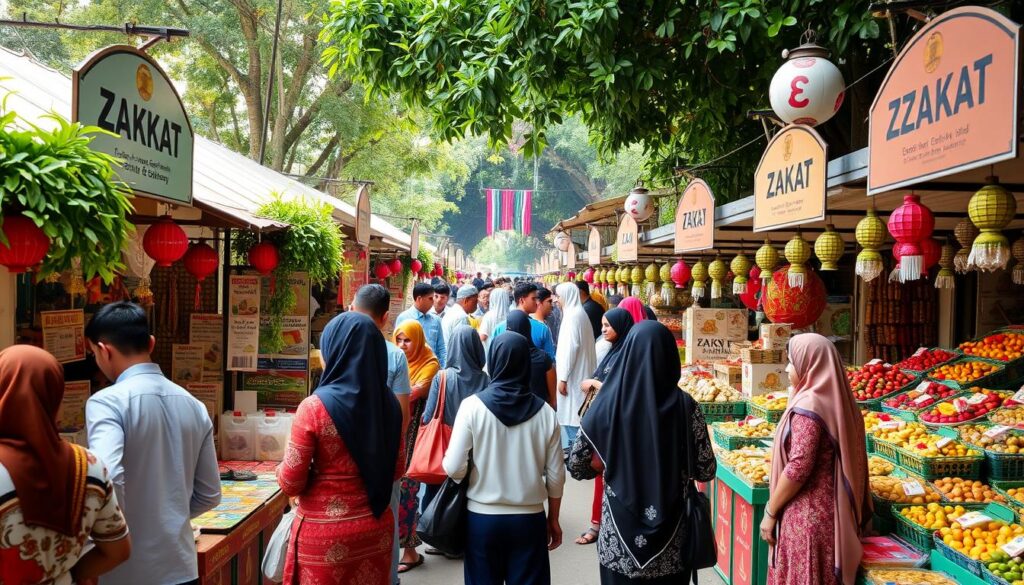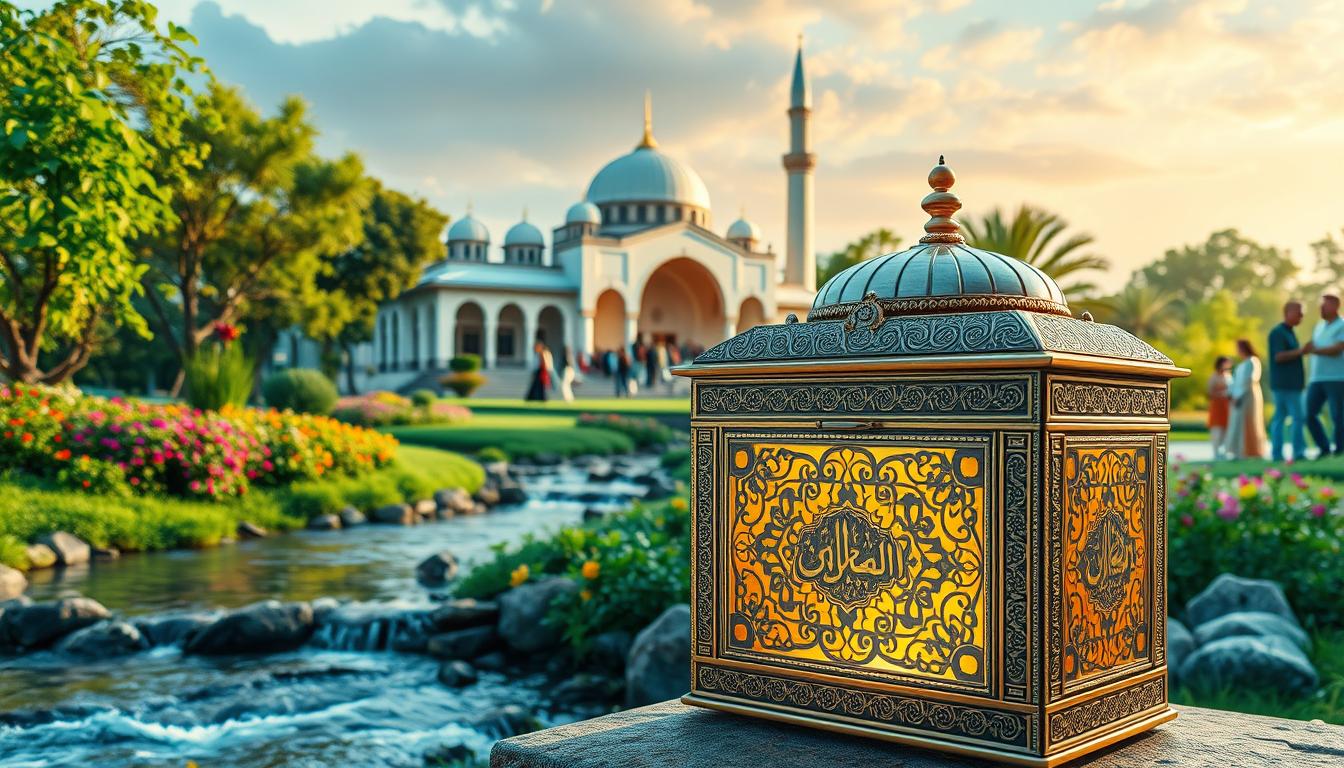We’re excited to talk about FAQs ON Zakat, a key act in Islam. It’s a way for Muslims to give back to the community. We’ll cover what Zakat is, why it’s important, and how to calculate it. You’ll learn about its benefits and how it helps both individuals and society.
Zakat is a big deal in Islam. It helps the community and shows our faith. We’ll show you how to apply Zakat in your life. This will help you make a positive change.
Zakat is 2.5% of your wealth each year. The minimum amount you need to give is about $5,055. We’ll make sure you understand Zakat well. This will help you start giving back.
Introduction to Zakat
We believe we can change lives together. That’s why we’re here to help you learn about Zakat. We want to give you the tools to get involved and make a difference.
Key Takeaways
- Zakat is a must-do in Islam. It helps those in need and strengthens our faith. We’ll guide you through it with FAQs.
- Zakat is 2.5% of your wealth each year. We’ll dive deeper into this, answering your questions.
- The minimum amount to give is about $5,055. We’ll explain this in more detail.
- Zakat-ul-Fitr is $10 per person. We’ll share more about this.
- You can give Zakat daily. Businesses can also plan ahead. We’ll explore these options.
- Zakat is more than money; it’s a spiritual act. We’ll discuss its spiritual side.
What is Zakat and Why is it Important?
Zakat is key for Muslim donors and volunteers who care about helping others. It’s about making wealth and soul pure, as the Quran says. Zakat helps those in need.
Zakat is big in Islamic faith and helps communities. It’s not just a duty; it’s about fairness and equality. Knowing Zakat lets us help our communities better.
Definition and Purpose of Zakat
Zakat is more than charity. It’s about recognizing our wealth as a trust from God. Giving to those in need shows our social responsibility.
Significance in Islamic Faith
Zakat is a key part of Islam, showing our faith and community commitment. It deepens our faith and connection with others. Zakat rules guide us to follow Islamic principles.
Role in Community Welfare
Zakat supports the needy, promoting justice and equality. It’s vital for community well-being. With Zakat, we can make a real difference.
Who is Obligated to Pay Zakat?
We aim to provide clear guidance on who must pay Zakat and what wealth is subject to it. The Mosque Foundation says Zakat is a must for all Muslims who have enough wealth, known as Nisab. This means anyone who is an adult, Muslim, sane, and owns the Nisab must pay Zakat.
To be eligible for Zakat, one must own the Nisab, be able to grow it, and have had it for a whole year. Zakat applies to cash, gold, silver, and other assets that can grow. We will look into the Zakat guidelines and Zakat basics to see who must pay Zakat and how it’s calculated.
Eligibility Criteria for Zakat
The criteria for Zakat are:
- Adult (have reached the age of puberty)
- Muslim
- Sane
- In complete ownership of the Nisab
It’s key to know these criteria to figure out who must pay Zakat. We will also cover FAQs on Zakat to answer common questions.
Types of Wealth Subject to Zakat
The wealth subject to Zakat includes:
- Cash
- Gold
- Silver
- Other assets with growth possibilities
We will dive deeper into these types of wealth. This will help us understand Zakat’s calculation and who must pay it.
How is Zakat Calculated?
We figure out Zakat by looking at the value of our stuff. We use a 2.5% rate on our wealth that can be given. First, we find the Nisab, the minimum wealth needed for Zakat. For personal stuff, it’s 3 US OZ of gold. For business, it’s also 3 US OZ of gold.
The Zakat rates change based on what we own. For example, crops get a 5% rate if they’re watered and 10% if they’re not. We must use these rates to make sure we pay the right amount.
Understanding Zakat Rules
Knowing the Zakat rules is key to getting it right. We need to think about the Nisab, the type of asset, and the Zakat rate. Using a Zakat calculator or talking to a scholar can help us pay the right amount.
Here are some important things to remember when figuring out Zakat:
- Zakat is owed after 12 full lunar months pass.
- Zakat is paid on many types of wealth, like gold, silver, cash, stocks, and more.
- Things like property and cars don’t have Zakat unless we plan to sell them.
What are the Different Types of Zakat?
We aim to give a full view of Zakat types, like Zakat al-Fitr and Zakat al-Mal. The Hidaya Foundation says Zakat al-Fitr is paid in Ramadan. Zakat al-Mal is for one’s wealth and assets.
Zakat has two main types: Zakat Al-Mal and Zakat Al-Fitr. Zakat Al-Mal is 2.5% of one’s net wealth. It’s needed when a Muslim reaches a certain wealth level called nisab. Zakat Al-Fitr, or Sadaqat al-Fitr, is a must for all Muslims at Ramadan’s end, no matter age or gender.
Key Differences Between Zakat al-Fitr and Zakat al-Mal
- Zakat al-Fitr is paid during Ramadan, while Zakat al-Mal is paid on one’s wealth and assets.
- Zakat al-Fitr is a fixed amount, equivalent to the cost of a meal, while Zakat al-Mal is calculated as 2.5% of one’s net wealth.
There are more charities in Islam, like Sadaqah and Waqf. We’ll dive into these, giving a full grasp of Zakat types and their role in Islamic faith.
When Should Zakat be Paid?
We believe paying Zakat on time is key to meeting our Islamic duties. The Islamic calendar is important for figuring out when to pay Zakat. Mosque Foundation says Zakat can be paid anytime, but Ramadan is best because of extra blessings.
Being able to pay Zakat anytime helps us give when it’s needed most. We should keep the Islamic calendar and hawl in mind. Hawl is a year in the Islamic calendar. The nisab, or minimum amount to pay Zakat, is based on the value of gold.
Some important things to remember about Zakat include:
* Zakat is given once a year, after a full lunar year, when your wealth meets the nisab.
* There are two types of wealth for Zakat: money, gold, and silver, and crops or minerals. Money and precious metals need a year, but crops and minerals should be given right away.
* Ramadan is a good time to give Zakat because of the extra blessings, but it’s not required.
Knowing the Islamic calendar and when to pay Zakat helps us make good choices. We should use this flexibility to help those in need. Let’s all make sure to pay Zakat on time and support those who need it.
| Zakat Type | Payment Time |
|---|---|
| Zakat al-Fitr | During Ramadan |
| Zakat-al-Mal | After 12 full lunar months of ownership |
| Harvests/Windfalls | Immediately after harvest |
Where Does Zakat Go?
We aim to clearly explain where Zakat goes and how it’s shared. Sound Vision says Zakat helps the poor, orphans, and those in debt. This is key for Transparency in Zakat, so donors know their money is used well.
The Zakat distribution process finds those who really need help. The Quran lists eight groups, like the poor and those in debt. Helping these groups improves our communities and supports social welfare.
Some main areas Zakat helps include:
- Orphan care and support
- Emergency relief and disaster response
- Education and community development
We focus on Transparency in Zakat and being accountable. This builds trust with our donors. It makes our Zakat distribution system better and more lasting.

| Category | Description |
|---|---|
| Poor and Needy | Individuals who lack the means to meet their basic needs |
| Orphans | Children who have lost one or both parents |
| Debtors | Individuals who are struggling to pay off debts |
Can Zakat be Paid to Organizations?
We think giving to trusted Zakat organizations is a smart way to help those in need. It’s key to pick the right place to give to make our donations count. Many Zakat charities and Zakat organizations are working hard to give Zakat to those who need it most.
The Zakat Foundation of America is a great example. It was started in 2001 to help around the world. They give Zakat to eight groups, like the poor and those helping others, as the Quran says.
When choosing a Zakat charity, check if they are open and honest. Look for groups that use donations wisely. By giving to charities that share our values and have a good name, we know our Zakat will help.
- Efficient distribution of Zakat to eligible recipients
- Transparency and accountability in the use of donations
- Opportunity to support a wide range of causes and projects
Supporting well-known Zakat organizations and Zakat charities helps change lives. It makes a big difference in our communities.
How Can I Calculate My Zakat?
Calculating Zakat can seem hard, which is why we offer Zakat calculation tools. These tools help figure out how much Zakat you owe each year. Our guide is simple to use and covers things like cash, gold, silver, investments, and business stock.
To find out your Zakat, you can use our online calculator or talk to Zakat experts. They can give you advice tailored to your situation. First, add up the value of things you can give Zakat on. Then, subtract any debts. Next, use the Zakat rate of 2.5%. For tricky cases, like investments or business assets, experts are a good idea.
Here’s a quick guide to get you started:
- Determine the total value of your eligible assets
- Subtract your debts and liabilities
- Apply the standard Zakat rate of 2.5%
- Consider consulting with Zakat experts for complex situations
With our Zakat tools and guide, you can make sure you’re giving Zakat correctly. We aim to make the Zakat process easy and straightforward. We’re here to help with all you need to know about Zakat.
| Asset Type | Zakat Rate |
|---|---|
| Cash and Gold | 2.5% |
| Silver and Investments | 2.5% |
| Business Inventory | 2.5% |
What Happens if Zakat is Not Paid?
Paying Zakat is key to our faith, and its role is huge. The Zakat consequences of not paying are serious. They affect us, our community, and society.
The Zakat impact on our spiritual health is big. Not paying Zakat can make us feel out of touch with our faith and community.
Some major effects of not paying Zakat include:
- Severe punishment in the hereafter
- Transformation of wealth into a huge bald serpent on Judgment Day
- Cauterization on the Day of Judgment and suffering in Hell for neglecting dues
It’s vital to pay Zakat on time. Seeking redemption by helping the needy is important. This way, we avoid the Zakat consequences and help our community and society.
Ways to Support Zakat Initiatives
We all have a role to play in supporting Zakat initiatives. There are many ways to get involved. By Supporting Zakat, we can change lives for the better. One way is by Volunteering for Zakat with groups like Umar Khan Charity. They work hard to help those hit by poverty and conflict.
Volunteering with Organizations
Volunteering with groups like Umar Khan Charity is a great choice. They need help with tasks like fundraising and giving aid. By volunteering, we can help others and support Zakat efforts.

Sharing Zakat Information on Social Media
Sharing Zakat info on social media is another good way to help. By posting about Zakat’s importance, we can spread the word. We can also share updates from Umar Khan Charity. This builds community and encourages support for their work.
Making In-Kind Donations
Making in-kind donations is a practical way to help. Giving food, clothes, and other items helps those in need. By donating, we ensure Zakat initiatives have what they need to help others.
How to Get Involved with Umar Khan Charity Organization?
At Umar Khan Charity, we think everyone can help those in need. You can volunteer your time or donate money. There are many ways to support our work.
Contact Information and Communication Channels
To learn more about Umar Khan Charity, reach out to us. Visit our website at umarkhancharityorganization.org for contact details. Our team is eager to help and share information about our projects.
Volunteer Opportunities Available
Umar Khan Charity needs volunteers to help with our programs. You can assist with food distribution, educational projects, and more. Check our website or contact us to find out how you can help.
Making a Difference Through Donations
Your donations are key to our work. They help us provide food, medical care, and education to those in need. Visit our website to see how you can donate and make a difference.






